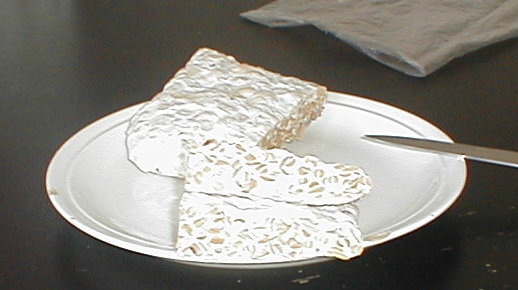Tempeh making 33c3: Difference between revisions
(Created page with "left|Block of tempeh (picture courtesy of Dan Merz) [https://dudle.inf.tu-dresden.de/tempehmaking33c3/ To secure spot on this workshop please sig...") |
No edit summary |
||
| Line 7: | Line 7: | ||
[https://foodhackingbase.org/wiki/Recipe:Tempeh_making_manual_-_short_workshop_form Workshop manual is shared here.] | [https://foodhackingbase.org/wiki/Recipe:Tempeh_making_manual_-_short_workshop_form Workshop manual is shared here.] | ||
[https://events.ccc.de/congress/2016/wiki/Session:Introduction_to_Soy_Bean_Fermentation_-_Tempeh_Making Link to official Self Organized Session at 33c3 wiki] | |||
Latest revision as of 17:40, 17 December 2016
To secure spot on this workshop please sign in here
This workshop is an introduction to soybean fermentation. It will take you through the preparation of the soybeans or other legumes, inoculation of the beans with the microbial culture and the subsequent harvesting and aging - your ferment should be ready for preparation and eating on the Day 3. We will focus on tempeh cultured by Rhizopus oligosporus which is nice and easy opening for beginners.
The diversity of the ferments which can be prepared from soybeans (and other legumes) is truly amazing, depending on the cultures (microbes) being used and conditions/techniques applied (and of course the treatment of the soybeans). In this workshop we will go through the basic steps which will secure proper preparation of the soy beans as a substrate for the microbes to inoculate it with. Optimal fermentation conditions will be discussed and devices making it easy to establish them suggested (Experimental Incubator for example). We will be also harvesting the previously made tempeh and as usually tasting samples of the final products. The results of this workshop should be ready for tasting on Day 3 (24-48 hours of fermentation is sufficient). Depending on the time and availability of the cultures tempeh starter Rhizopus oligosporus and/or nattō starter Bacillus subtilis will be used and discussed. We will do our best to provide the participants with adequate starter cultures for their experiment. This workshop is donation based no one turned away for lack of funds. If you can afford to donate, please do I Algoldor will be very happy to use it for my future projects and also my living expenses.
